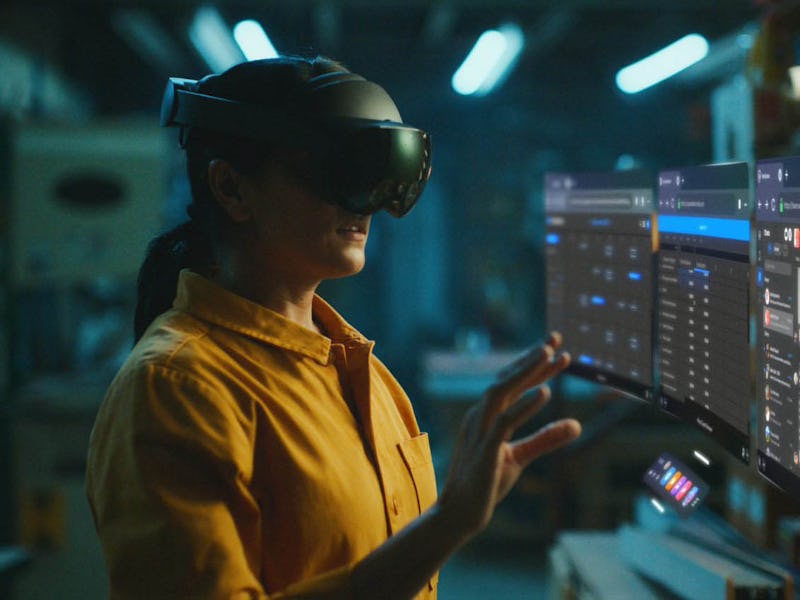The 4 biggest takeaways from Meta's Quest Pro event
Meta's Connect event offered a deluge of updates to its Quest headset, VR games, and work apps.

If there were any questions about Meta’s commitment to pioneering a new age of computing technology, a more than hour-long Connect event on Tuesday — and a deluge of updates on VR games, work apps, and new hardware — should dispel any doubts. Meta is serious about VR, and it’s got the deep pockets to prove it.
Here are the four biggest takeaways from Meta’s Connect event.
4. Going Pro
Meta’s Quest Pro VR headset in all of its expensive glory.
As expected, the focal point of Connect this year was the unveiling of Meta’s next-gen headset, the Quest Pro. The open question, however, was what exactly “pro” means to Meta.
As we’ve now learned, the pro aspect is reflected not just in the way Meta is marketing the headset, but in its eye-watering $1,500 price. In terms of capabilities, the Quest Pro, unlike previous Quest headsets, comes equipped to handle full-on mixed reality. That means wearers will be able to use the headset while still semi-grounded in their surrounding environment, as several high-def external cameras allow visual passthrough. No more black-and-white Guardian boundaries like on the Quest 2.
Theoretically, the addition of mixed reality could make the Quest Pro better suited as a virtual multi-monitor work setup, a professional augmented reality device, or as a creative tool for illustrators and designers. On the latter front, the Quest Pro (and its revamped controllers) come with an attachable stylus. Fun!
All of this is to say that the Quest Pro is a different machine, not just technically, but philosophically. In the case of Meta’s VR hardware, the word “pro” should be taken literally. This is a tool that does work.
3. All work, no play
Meta leaned into work applications, positioning the Quest Pro aas a truly “pro” headset.
While gaming has been the biggest driver in VR adoption, Meta sees opportunity in what could arguably be defined as the opposite of entertainment: work.
Meta devoted a significant portion of its Connect event to detailing updates and applications to work VR. Among those updates were up-and-coming apps like Magic Room, where users are meant to use the Quest Pro’s mixed reality capabilities to meet and collaborate in hybrid VR environments. Microsoft also got a significant plug toward the end of the keynote for its role in integrating Teams.
Perhaps more telling than the work applications themselves is the fact that they took precedence over gaming. Meta started its Connect event talking about work, and returned to the topic several times. Games, on the other hand, were discussed in a vacuum, with little to no featured gameplay.
That’s not to suggest Meta is abandoning VR gaming completely. Rumors suggest that a Quest 3 headset could be in the works, which would be the ideal hardware for more hobbyist and casual VR consumers, and a better venue for Meta to lean into VR gaming.
2. Avat(AR)
Meta’s new and improved avatars. With legs!
Just a few months ago, Meta — Mark Zuckerberg, specifically — was once again on the receiving end of the internet’s metaverse mockery. The general consensus from critics was that Horizon Worlds — the anointed venue for Meta’s future plans to build communal VR spaces — could use a major visual upgrade.
Meta tacitly acknowledged those critiques, showcasing some graphical improvements to avatars. The results aren’t exactly what most would call next-gen but they’re still a marked improvement. Meta still has a long way to go before its promises match up with reality, but it’s clearly taking criticisms into account. Plus, Meta avatars have legs now!
1. More to come...
Meta is working on more than just new VR headsets according to a teaser at its Connect event.
With Meta’s enormous investments in developing the technology necessary to sustain a next-gen metaverse, we can expect more VR hardware down the line. Part of the Connect showcase — perhaps one of the more interesting sections — focused on just that.
Specifically, Meta teased an in-development band that is capable of registering subtle hand and finger movements. The device, a pseudo smartwatch-like strap, could be used to control interfaces on phones, computers, and more.
Included in the “more” part would be Meta’s AR glasses, which the company hasn’t given up on. To achieve its lofty vision of the metaverse, Meta will be tasked with decreasing the barrier between users and apparatus. While it spends lots of time plugging exercise and work applications for its VR headset, it also seems to acknowledge that wearing one for hours and hours at a time isn’t ideal.
Whether it will be able to bring those visions from the lab to the lives of millions of users, however, remains to be seen.
Inverse may receive a portion of sales if you purchase a product through a link in this article.